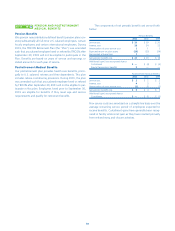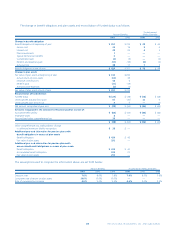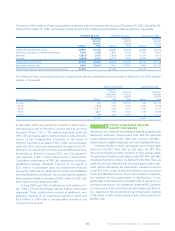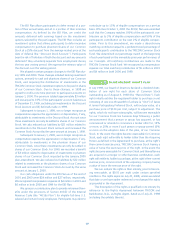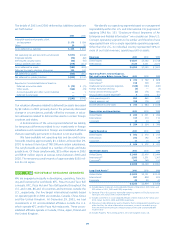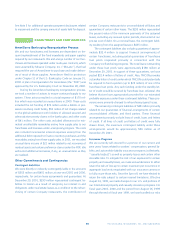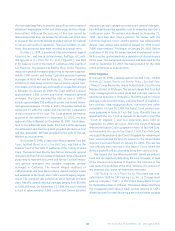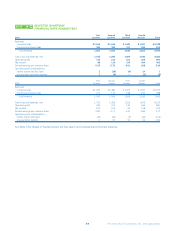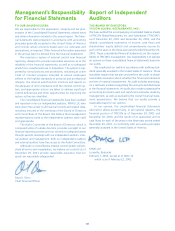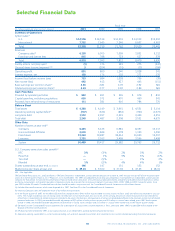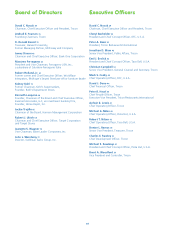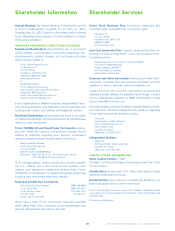Pizza Hut 2001 Annual Report Download - page 64
Download and view the complete annual report
Please find page 64 of the 2001 Pizza Hut annual report below. You can navigate through the pages in the report by either clicking on the pages listed below, or by using the keyword search tool below to find specific information within the annual report.62 TRICON GLOBAL RESTAURANTS, INC. AND SUBSIDIARIES
the estimated legal fees incurred by plaintiffs and the results of
settlement negotiations in this and other wage and hour litiga-
tion matters. Although the outcome of this case cannot be
determined at this time, we believe the ultimate cost of this case
in excess of the amounts already provided will not be material
to our annual results of operations, financial condition or cash
flows. Any provisions have been recorded as unusual items.
On May 11, 1998, a purported class action lawsuit against
Pizza Hut, Inc., and one of its franchisees, PacPizza, LLC, enti-
tled Aguardo, et al. v. Pizza Hut, Inc., et al., (“Aguardo”), was filed
in the Superior Court of the State of California of the County of
San Francisco. The lawsuit was filed by three former Pizza Hut
restaurant general managers purporting to represent approxi-
mately 1,300 current and former California restaurant general
managers of Pizza Hut and PacPizza, LLC. The lawsuit alleged
violations of state wage and hour laws involving unpaid over-
time wages and vacation pay and sought an unspecified amount
in damages. On January 12, 2000, the Court certified a class of
approximately 1,300 current and former restaurant general
managers. The Court amended the class on June 1, 2000 to
include approximately 150 additional current and former restau-
rant general managers. On May 2, 2001, the parties reached an
agreement to settle this matter and entered into a stipulation
of discontinuance of the case. The Court granted preliminary
approval of the settlement on September 27, 2001, and final
approval of the settlement on December 20, 2001. As no objec-
tions to the settlement were made, the Court’s order approving
the settlement and dismissing with prejudice all claims is final
and non-appealable. We have provided for the costs of this set-
tlement as unusual items.
On October 2, 1996, a class action lawsuit against Taco Bell
Corp., entitled Mynaf, et al. v.Taco Bell Corp., was filed in the
Superior Court of the State of California of the County of Santa
Clara. The lawsuit was filed by two former restaurant general
managers and two former assistant restaurant general managers
purporting to represent all current and former Taco Bell restau-
rant general managers and assistant restaurant general
managers in California. The lawsuit alleged violations of
California wage and hour laws involving unpaid overtime wages
and violations of the State Labor Code’s record-keeping require-
ments. The complaint also included an unfair business practices
claim. Plaintiffs claimed individual damages ranging from $10,000
to $100,000 each. On September 17, 1998, the court certified
a class of approximately 3,000 current and former assistant
restaurant general managers and restaurant general managers.
Taco Bell petitioned the appellate court to review the trial court’s
certification order. The petition was denied on December 31,
1998. Taco Bell then filed a petition for review with the
California Supreme Court, and the petition was subsequently
denied. Class notices were mailed on August 31, 1999 to over
3,400 class members. Trial began on January 29, 2001. Before
conclusion of the trial, the parties reached an agreement to set-
tle this matter, and entered into a stipulation of discontinuance
of the case. This settlement agreement was approved by the
court on September 21, 2001. We have provided for the costs
of this settlement as unusual items.
Other Litigation
On January 16, 1998, a lawsuit against Taco Bell Corp., entitled
Wrench LLC, Joseph Shields and Thomas Rinks v.Taco Bell Corp.
(“Wrench”) was filed in the United States District Court for the
Western District of Michigan. The lawsuit alleges that Taco Bell
Corp. misappropriated certain ideas and concepts used in its
advertising featuring a Chihuahua. Plaintiffs seek to recover
damages under several theories, including breach of implied-in-
fact contract, idea misappropriation, conversion and unfair
competition. On June 10, 1999, the District Court granted sum-
mary judgment in favor of Taco Bell Corp. Plaintiffs filed an
appeal with the U.S. Court of Appeals for the Sixth Circuit (the
“Court of Appeals”), and oral arguments were held on
September 20, 2000. On July 6, 2001, the Court of Appeals
reversed the District Court’s judgment in favor of Taco Bell Corp.
and remanded the case to the District Court. Taco Bell Corp.
unsuccessfully petitioned the Court of Appeals for rehearing en
banc, and its petition for writ of certiorari to the United States
Supreme Court was denied on January 21, 2002. The case has
now officially been returned to the District Court, where the
Wrench plaintiffs will be allowed to bring their claims to trial.
We believe that the Wrench plaintiffs’ claims are without
merit and are vigorously defending the case. However, in view
of the inherent uncertainties of litigation, the outcome of the
case cannot be predicted at this time. Likewise, the amount of
any potential loss cannot be reasonably estimated.
C&F Packing Co., Inc. v. Pizza Hut, Inc. This action was origi-
nally filed in 1993 by C&F Packing Co., Inc., a Chicago meat
packing company (“C&F”), in the United States District Court
for the Northern District of Illinois. This lawsuit alleges that Pizza
Hut misappropriated various trade secrets relating to C&F’s
alleged process for manufacturing a precooked Italian sausage



